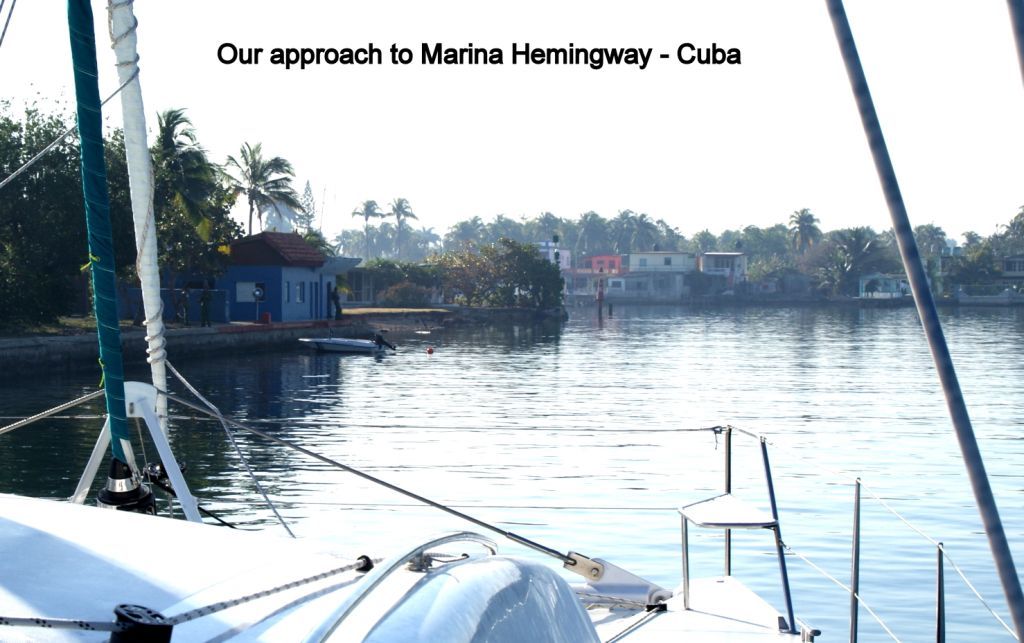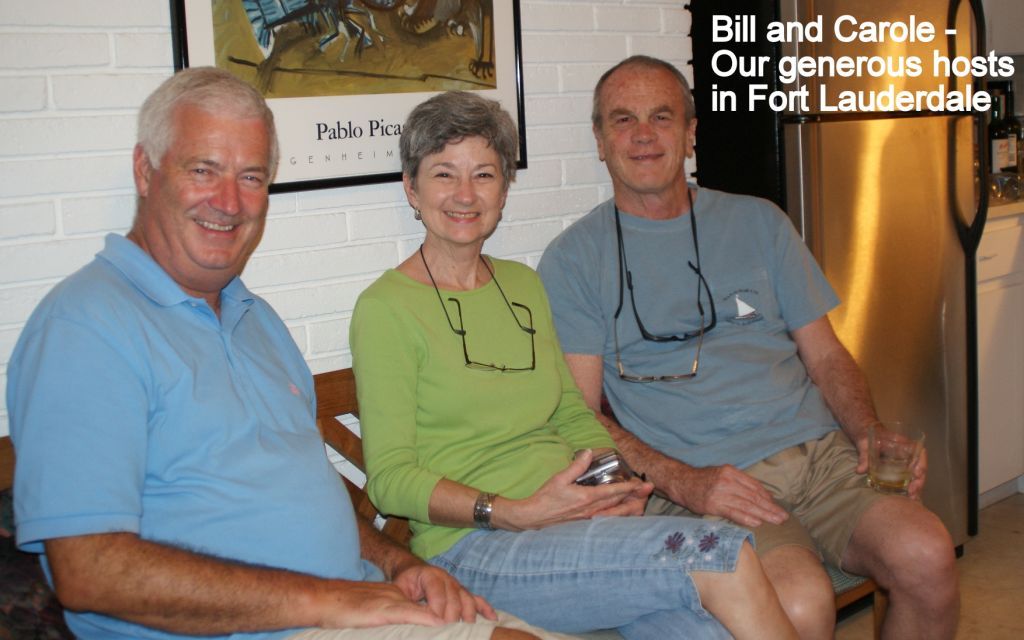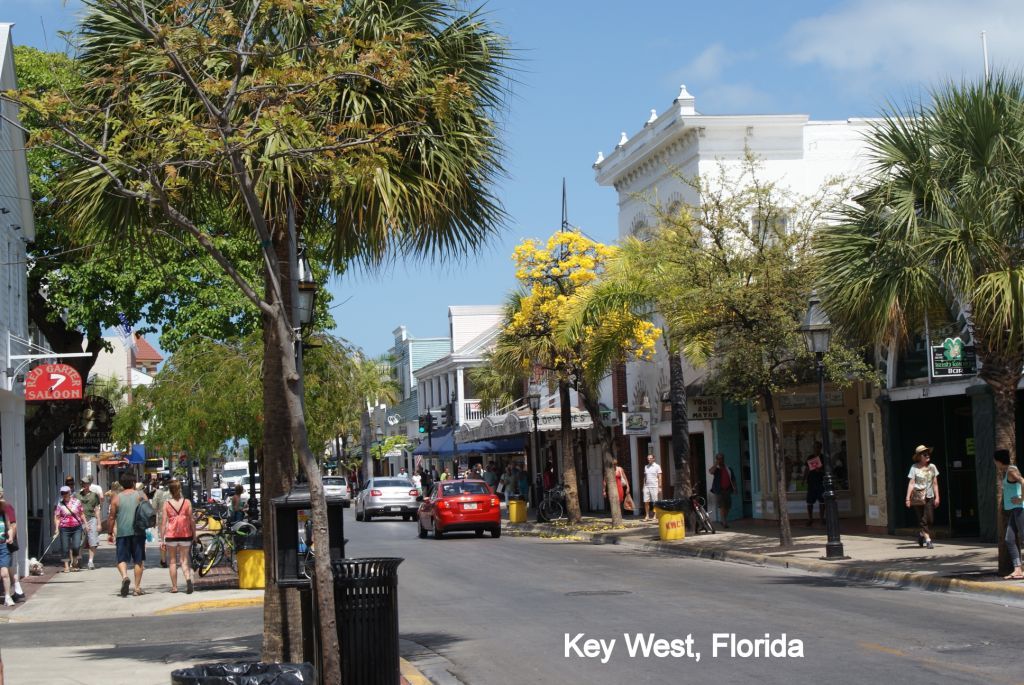Our stay in Fort Lauderdale
was longer than planned as, whilst we were back in England an electrical fault
developed which needed to be addressed. We were blessed on several
counts. Firstly, Bill and Carole, who not only let us use the dock at the
bottom of their garden, but who checked our boat when we were away, provided a
car whenever we needed it, put up with endless to-ing and fro-ing through their
garden, and invited us to dinner. Pam Wall, the Ocean Cruising Club Port
Officer for Fort Lauderdale
was fantastic in her help and advice. Pam is tiny, but her welcome and
support are enormous. Ben Collett,
from Discovery Yachts, joined us and
quickly and good-heartedly set to work on completing the jobs we had.
It was good to get sailing again, having spent several
days long-term provisioning for our trip across the Pacific and being tied to
one place for a while. We were able to be goose-winged for much of the
sail to Key West,
the most southern city in the States. Cruise ships, jet
skis, parasailing, rather tacky tourist shops and Key Lime pie are some of the
images that give Key West
its vacation feel, but it also had some lots of street entertainment and some
good restaurants.
It was with some trepidation that we set sail for Cuba.
We had had the comfort, security and certainty of sailing in the States for a
long time. Now we were taking the first step on our trip to the Antipodes. Trying to rationalize what we were
doing, I took comfort in the finding significance in our timing: it was exactly
a year since we had moved on to the boat and, as we crossed the three-mile line
from Key West and the sun slipped below the horizon, our log showed 10,000
miles The neon glow from the American coast was replaced by a heavenly
dome of black velvet studded with stars and then, just after crossing the
mid-point of the Gulf Stream night pushed up a beautiful sunrise –
something which never ceases to impress me.
We were heading to Marina Hemingway. It’s
really the only place to leave your boat if you are visiting Havana – a marina built in the early
50s, comprising of three wide canals, one of which is for foreigners. The
entrance is a cut through a shallow reef, which at one point we avoided by only
two meters. Royal palms and lush vegetation were silhouetted in the early
morning sun, the light hazy from the burning of harvested sugar-cane fields.
We were forewarned of the lengthy clearing-in
procedure. The moment I jumped off the boat to secure our lines,
immigration offices came onboard and whisked our passports back to their
office. Meanwhile a doctor filled out several pages, asking details of
immunization and whether plague had occurred of been suspected amongst the rats
and mice on board. Next came a representative of the Ministry of
Agriculture, who inspected our fruit, vegetables and meat, followed by the
anti-drug agent with his sniffer dog. We were pleased to see the Customs
officials and they came holding our passports: they had to seal our
flares and then lock them away. Finally the very helpful Harbour Master, full
of advice about the marina, currency exchange, getting to Havana, etc., directed us to our berth, where
five people were ready to take our lines. All the people we had
encountered were courteous and gracious. They met us more than half-way
in over-coming language difficulties were keen to help in other ways.
It was sad though that, right from our arrival, it was
very apparent that resources were few and that the Cubans had learnt to get by
with what they had, despite the frustrations of their situation. For instance,
when the Customs officers needed to apply the paper stamps to our entry
paperwork they had to ask whether we had any glue; the Harbour Master,
frustrated by the inconvenience of no paper clips in his office had tried to
buy some with his own money, but they are only available in stores accessible
to government officials. Having found the job of fisherman hard work, the
Harbour Master had been pleased to have a job where he could see his family on
a daily basis, but after twenty years in the job he questions the need for
having so much paperwork and whether the information he collects has ever been
put to good use. At least everyone has work.
So we have arrived in Cuba. The most western port
we shall be in until after we have been through the Panama and (at 23degrees 5 minutes
north) virtually in the tropics. We are looking forward to exploring Havana and the countryside
to the west.






